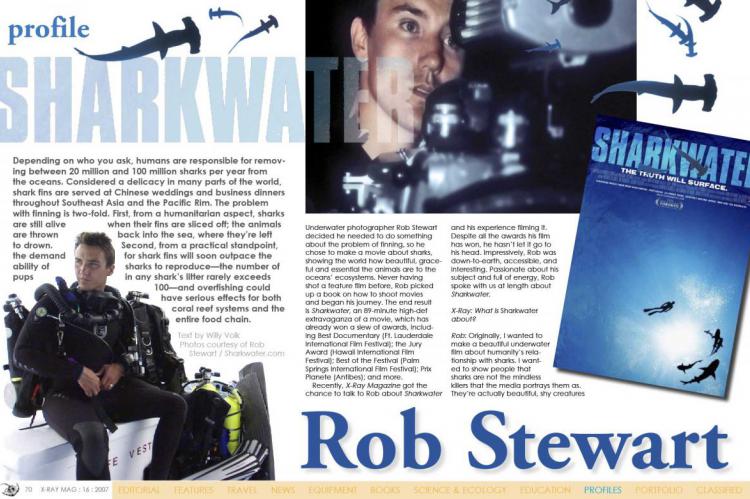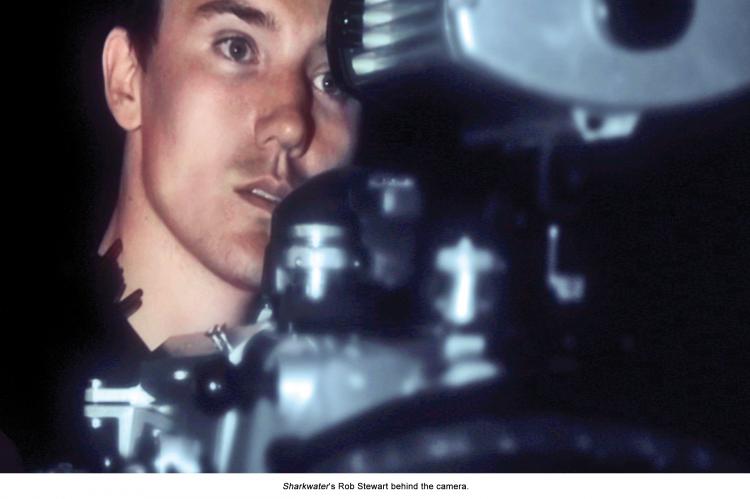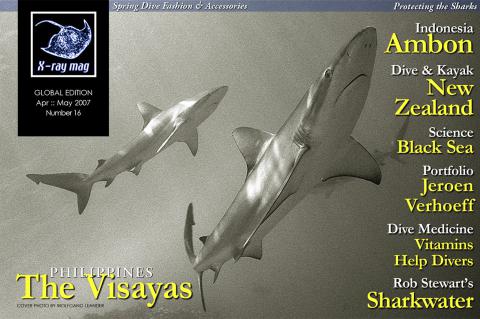Rob Stewart
Depending on who you ask, humans are responsible for removing between 20 million and 100 million sharks per year from the oceans. Considered a delicacy in many parts of the world, shark fins are served at Chinese weddings and business dinners throughout Southeast Asia and the Pacific Rim. The problem with finning is two-fold. First, from a humanitarian aspect, sharks are still alive when their fins are sliced off; the animals are thrown back into the sea, where they’re left to drown. Second, from a practical standpoint, the demand for shark fins will soon outpace the ability of sharks to reproduce—the number of pups in any shark’s litter rarely exceeds 100—and overfishing could have serious effects for both coral reef systems and the entire food chain.
Tags & Taxonomy
Recently, X-Ray Magazine got the chance to talk to Rob about Sharkwater and his experience filming it. Despite all the awards his film has won, he hasn’t let it go to his head. Impressively, Rob was down-to-earth, accessible, and interesting. Passionate about his subject and full of energy, Rob spoke with us at length about Sharkwater.
X-Ray: What is Sharkwater about?
Rob: Originally, I wanted to make a beautiful underwater film about humanity’s relationship with sharks. I wanted to show people that sharks are not the mindless killers that the media portrays them as. They’re actually beautiful, shy creatures who avoid humans. So, I went down to Costa Rica to film them. However, it didn’t work out that way. After about four months, I realized I wasn’t getting the underwater footage I had been hoping for, because we were busy outrunning pirate boats, being charged with attempted murder and uncovering an underground shark finning operation in Costa Rica. In order to protect ourselves, I turned the cameras on us. Although I wasn’t getting the shark footage, all this human drama was unfolding all around me. It was a crazy experience that covered 15 countries and four and a half years. Sharkwater is not like any movie out there. It’s not really a documentary. It’s not really a film. It’s more of a “reality journey.”
X-Ray: Did you head to Costa Rica with the intent of uncovering the shark finning operations, or did you just stumble upon it?
Rob: I went to Costa Rica to film sharks off Cocos Island with Sea Shepard, which had been invited by the President of Costa Rica to help monitor sharks in the area. I wanted to work with Sea Shepard’s conservation initiative and get underwater with the sharks. But I had no idea of the extent of the corruption in the area. The Taiwan Mafia has established a huge shark finning operation there.
X-Ray: I thought Costa Rica was known for being very eco-minded.
Rob: Costa Rica is known for being very eco-minded, but in reality, Costa Rica’s sharks are just protected on paper. There’s lots of shark finning going on. It’s a multi-billion dollar operation.
X-Ray: Could anyone heading to Costa Rica see the shark finning operations? Or are they well-hidden?
Rob: You couldn’t just go down there and see them. The Taiwan Mafia is extremely well-hidden. The shark finning operations have their own private bay in Puntarenas and their own private docks. They’re down long dirt roads, and you can’t go down there.
X-Ray: If they have their own bay and docks, doesn’t the government have to know about it? Are they just ignoring it?
Rob: Exactly, the Costa Rican government is turning a blind eye to finning. But now the public has learned about it, and a local non-profit, PRETOMA, is suing the government for letting finning occur and for allowing the depletion of the country’s resources. After all, the natural resources of Costa Rica are owned by its citizens.
X-Ray: You’ve said that sharks are “the most misunderstood animals in the world.” What is the biggest misunderstanding about sharks?
Rob: Probably the biggest misunderstanding is that they’re primitive eating machines. That’s not the case. They’re very sophisticated animals that have survived on the earth for hundreds of millions of years. Over the course of their evolution, they’ve evolved to become sleeker. Like electronics, they’ve become smaller and more efficient. They’re amazing animals. Another misunderstanding about sharks is that they want to eat humans. They don’t. In fact, most shark attacks aren’t attacks at all. They’re “mistakes.” However, newspapers sell more if they run stories about shark attacks splashed across their pages.
X-Ray: Other than divers and conservationists, it seems very few people are trying to protect sharks. Why do you think there are no “Save the Sharks” campaigns like there are “Save the Whales” campaigns?
Rob: First of all, sharks are a relatively new fishery. People only started fishing for sharks in the late-80s. On the other hand, whales have been fished for a while, and people have had a long time to see what effect removing them from
Download the full article ⬇︎

Originally published
X-Ray Mag #16
PHILIPPINES - Diving the Visayas. AMBON - the spice islands in Indonesia. Protecting the Sharks: Wolfgang Leander + Rob Stewart/Sharkwater movie. Divemedicine: Why antioxidants protects divers. NEW Zealand - land of the Kiwis. Rebreathers: Comfort and Efficiency. WHY shoot video. SPRING DIVE Fashion. Science: The Black Sea. New Equipment. Report from Moscow.



